Unit 1 Where did you go on vacation? Section A 1a--2d思维导图+知识点梳理+过关练习
文档属性
| 名称 | Unit 1 Where did you go on vacation? Section A 1a--2d思维导图+知识点梳理+过关练习 | 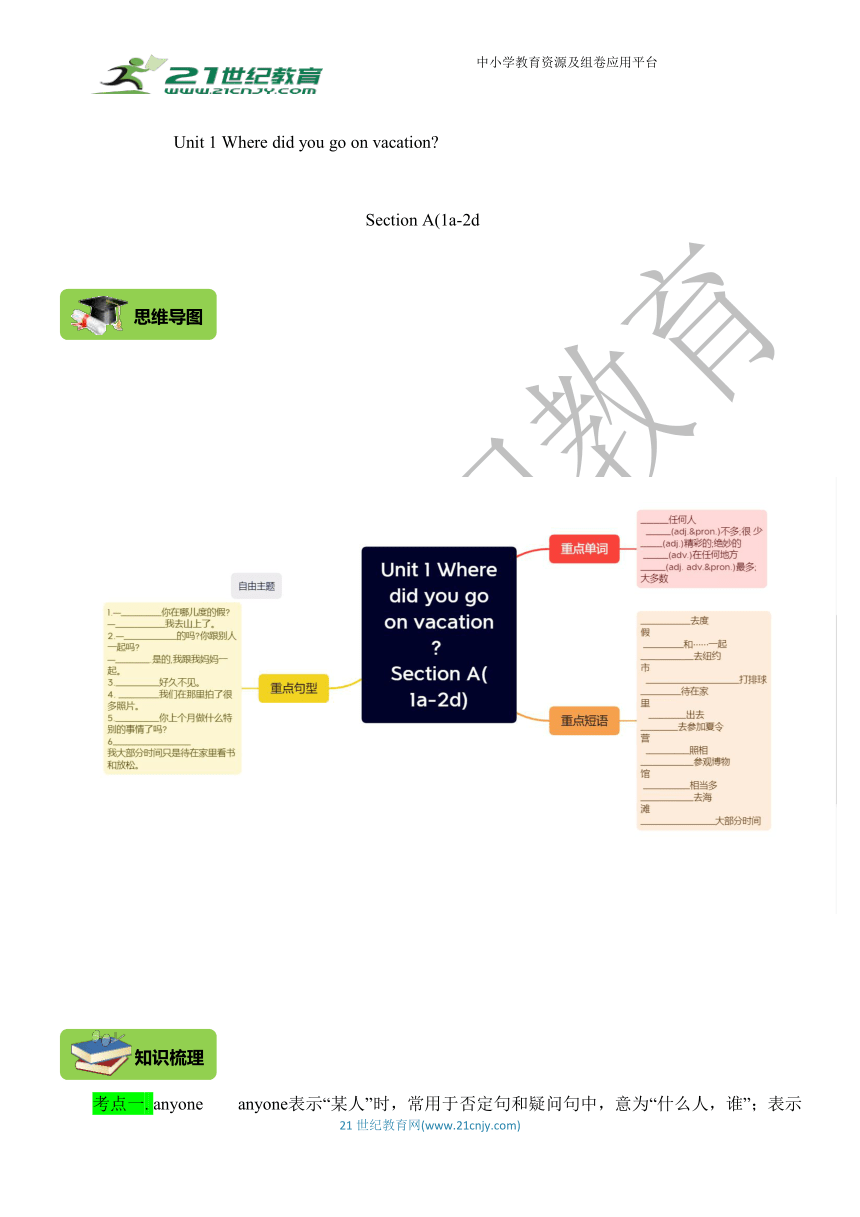 | |
| 格式 | docx | ||
| 文件大小 | 1.4MB | ||
| 资源类型 | 试卷 | ||
| 版本资源 | 人教新目标(Go for it)版 | ||
| 科目 | 英语 | ||
| 更新时间 | 2022-08-29 16:34:48 | ||
图片预览

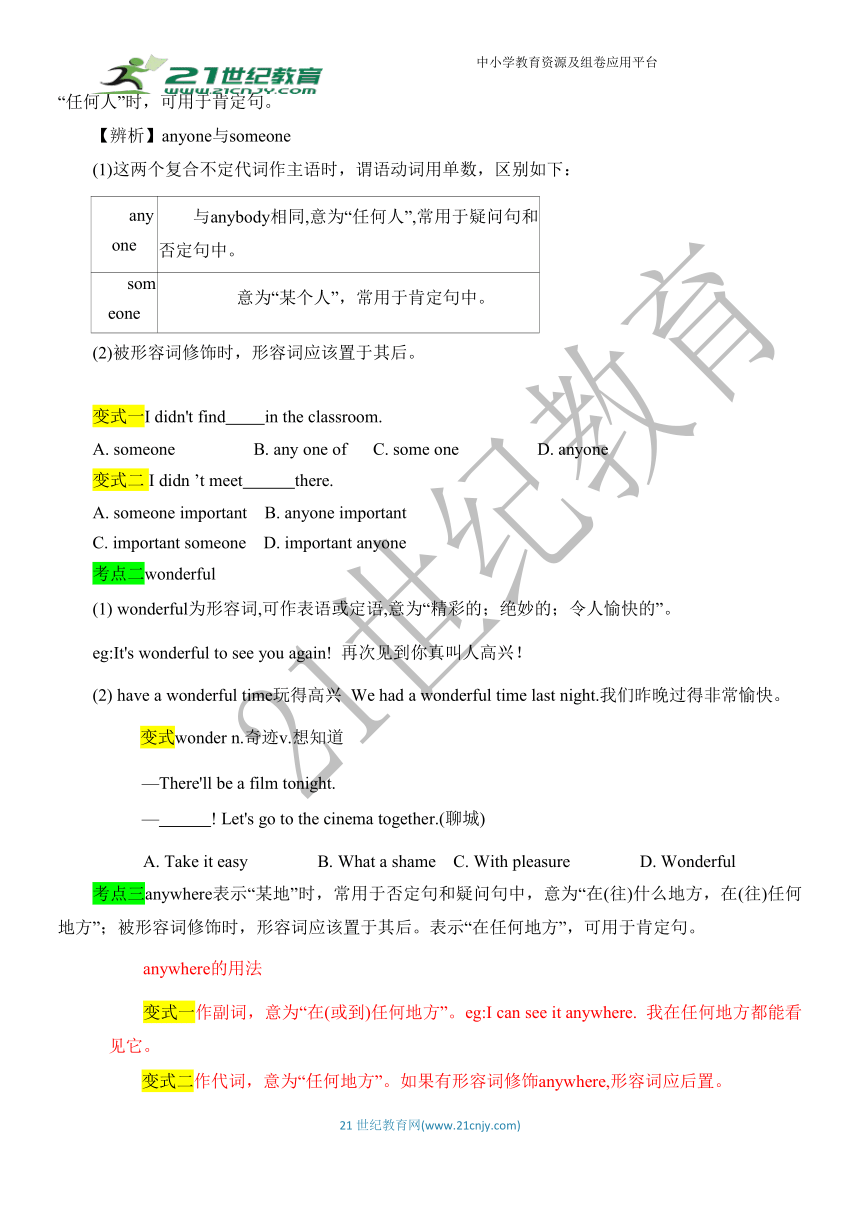
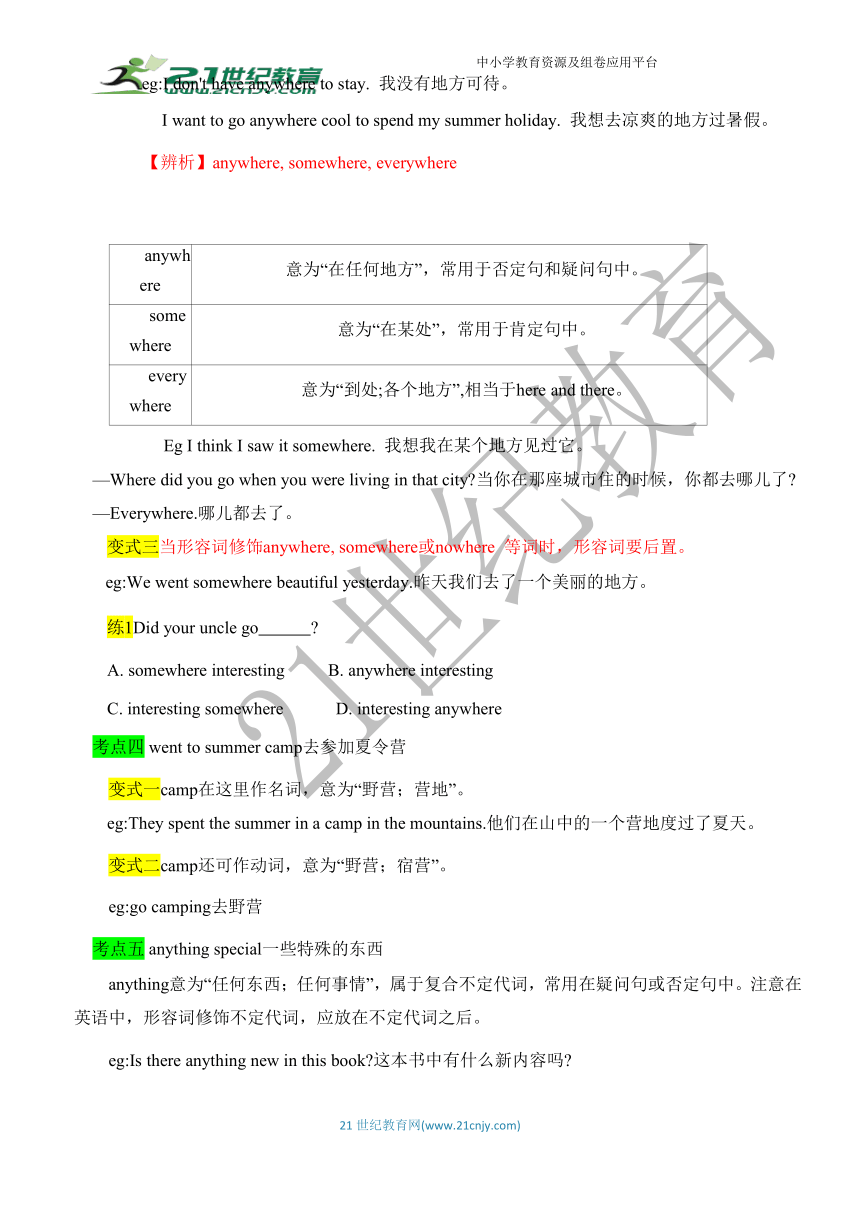
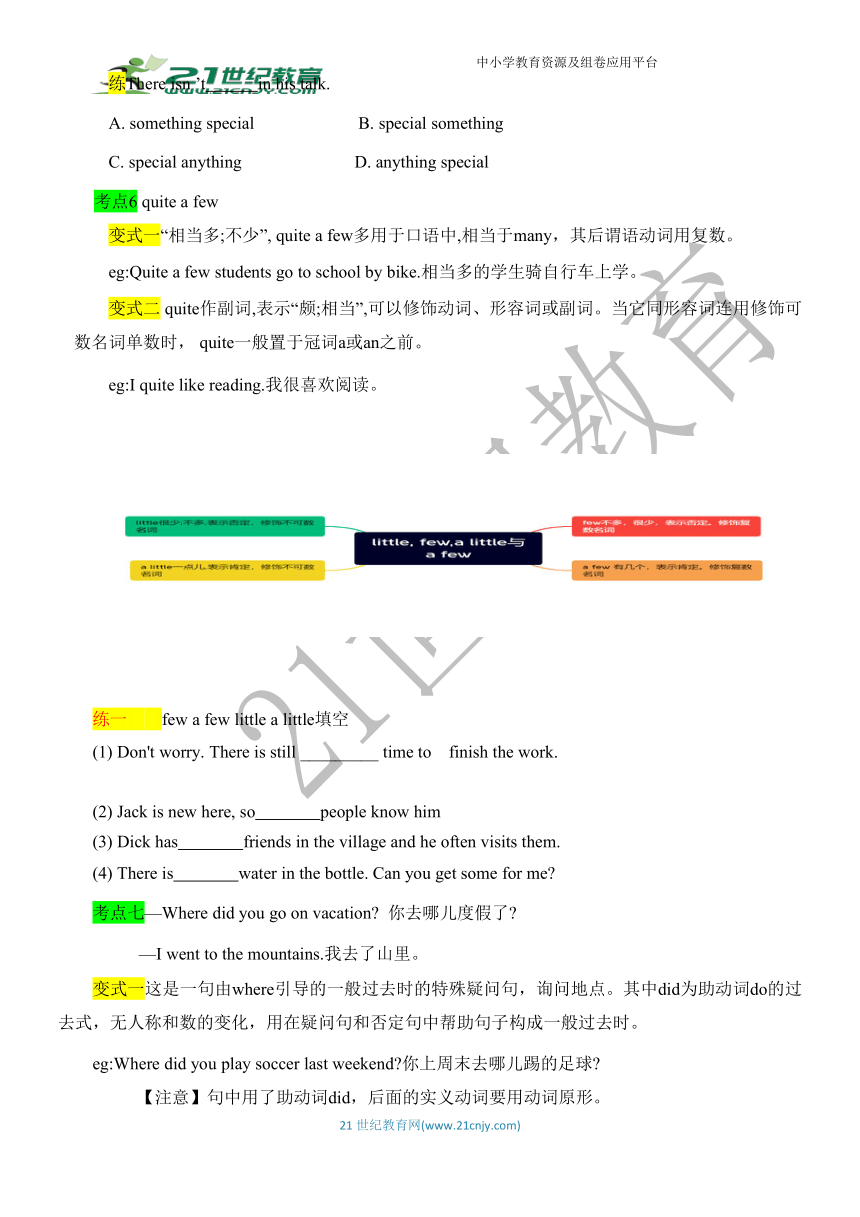
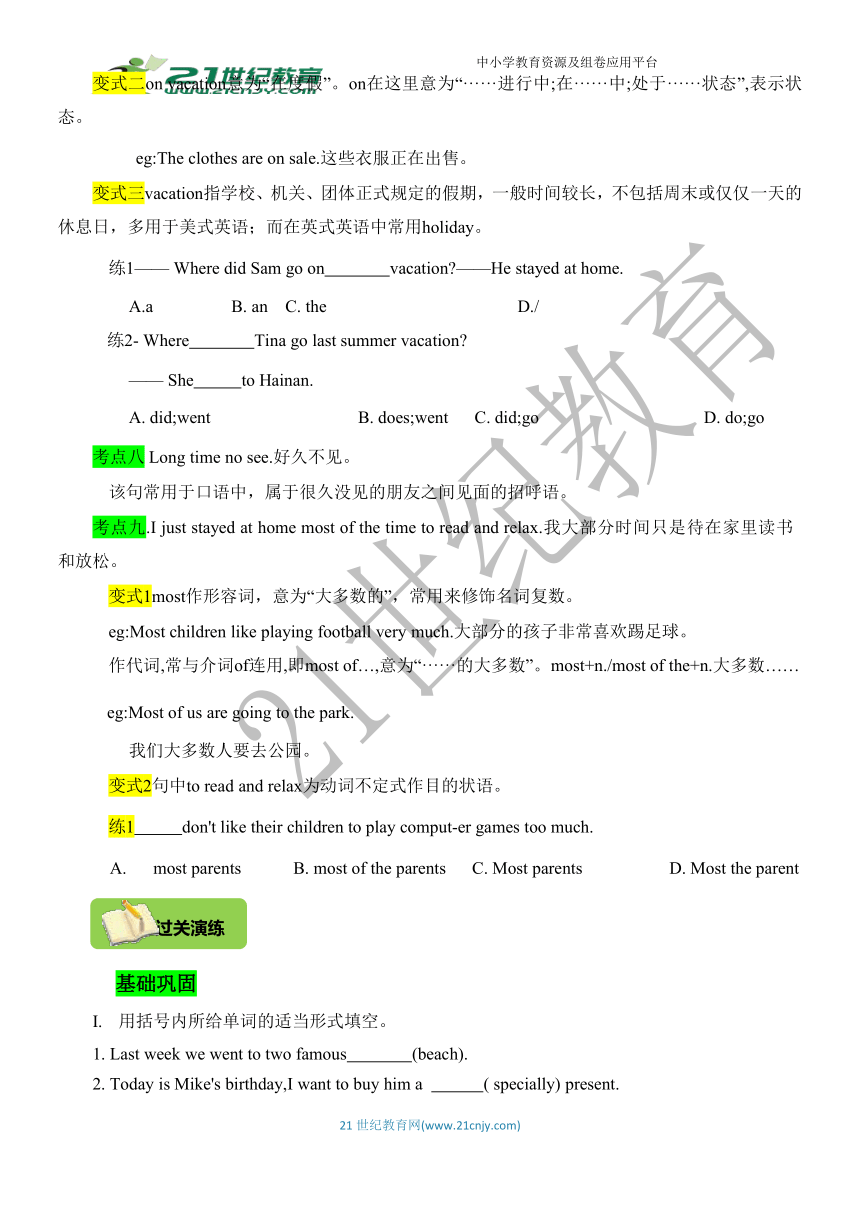
文档简介
Unit 1 Where did you go on vacation
Section A(1a-2d
考点一. anyone anyone表示“某人”时,常用于否定句和疑问句中,意为“什么人,谁”;表示“任何人”时,可用于肯定句。
【辨析】anyone与someone
(1)这两个复合不定代词作主语时,谓语动词用单数,区别如下:
anyone 与anybody相同,意为“任何人”,常用于疑问句和否定句中。
someone 意为“某个人”,常用于肯定句中。
(2)被形容词修饰时,形容词应该置于其后。
变式一I didn't find in the classroom.
A. someone B. any one of C. some one D. anyone
变式二I didn ’t meet there.
A. someone important B. anyone important
C. important someone D. important anyone
考点二wonderful
(1) wonderful为形容词,可作表语或定语,意为“精彩的;绝妙的;令人愉快的”。
eg:It's wonderful to see you again! 再次见到你真叫人高兴!
(2) have a wonderful time玩得高兴 We had a wonderful time last night.我们昨晚过得非常愉快。
变式wonder n.奇迹v.想知道
—There'll be a film tonight.
— ! Let's go to the cinema together.(聊城)
A. Take it easy B. What a shame C. With pleasure D. Wonderful
考点三anywhere表示“某地”时,常用于否定句和疑问句中,意为“在(往)什么地方,在(往)任何地方”;被形容词修饰时,形容词应该置于其后。表示“在任何地方”,可用于肯定句。
anywhere的用法
变式一作副词,意为“在(或到)任何地方”。eg:I can see it anywhere. 我在任何地方都能看见它。
变式二作代词,意为“任何地方”。如果有形容词修饰anywhere,形容词应后置。
eg:I don't have anywhere to stay. 我没有地方可待。
I want to go anywhere cool to spend my summer holiday. 我想去凉爽的地方过暑假。
【辨析】anywhere, somewhere, everywhere
anywhere 意为“在任何地方”,常用于否定句和疑问句中。
somewhere 意为“在某处”,常用于肯定句中。
everywhere 意为“到处;各个地方”,相当于here and there。
Eg I think I saw it somewhere. 我想我在某个地方见过它。
—Where did you go when you were living in that city 当你在那座城市住的时候,你都去哪儿了
—Everywhere.哪儿都去了。
变式三当形容词修饰anywhere, somewhere或nowhere 等词时,形容词要后置。
eg:We went somewhere beautiful yesterday.昨天我们去了一个美丽的地方。
练1Did your uncle go
A. somewhere interesting B. anywhere interesting
C. interesting somewhere D. interesting anywhere
考点四 went to summer camp去参加夏令营
变式一camp在这里作名词,意为“野营;营地”。
eg:They spent the summer in a camp in the mountains.他们在山中的一个营地度过了夏天。
变式二camp还可作动词,意为“野营;宿营”。
eg:go camping去野营
考点五 anything special一些特殊的东西
anything意为“任何东西;任何事情”,属于复合不定代词,常用在疑问句或否定句中。注意在英语中,形容词修饰不定代词,应放在不定代词之后。
eg:Is there anything new in this book 这本书中有什么新内容吗
练There isn ’t in his talk.
A. something special B. special something
C. special anything D. anything special
考点6 quite a few
变式一“相当多;不少”, quite a few多用于口语中,相当于many,其后谓语动词用复数。
eg:Quite a few students go to school by bike.相当多的学生骑自行车上学。
变式二 quite作副词,表示“颇;相当”,可以修饰动词、形容词或副词。当它同形容词连用修饰可数名词单数时, quite一般置于冠词a或an之前。
eg:I quite like reading.我很喜欢阅读。
练一 few a few little a little填空
(1) Don't worry. There is still _________ time to finish the work.
(2) Jack is new here, so people know him
(3) Dick has friends in the village and he often visits them.
(4) There is water in the bottle. Can you get some for me
考点七—Where did you go on vacation 你去哪儿度假了
—I went to the mountains.我去了山里。
变式一这是一句由where引导的一般过去时的特殊疑问句,询问地点。其中did为助动词do的过去式,无人称和数的变化,用在疑问句和否定句中帮助句子构成一般过去时。
eg:Where did you play soccer last weekend 你上周末去哪儿踢的足球
【注意】句中用了助动词did,后面的实义动词要用动词原形。
变式二on vacation意为“在度假”。on在这里意为“······进行中;在······中;处于······状态”,表示状态。
eg:The clothes are on sale.这些衣服正在出售。
变式三vacation指学校、机关、团体正式规定的假期,一般时间较长,不包括周末或仅仅一天的休息日,多用于美式英语;而在英式英语中常用holiday。
练1—— Where did Sam go on vacation ——He stayed at home.
A.a B. an C. the D./
练2- Where Tina go last summer vacation
—— She to Hainan.
A. did;went B. does;went C. did;go D. do;go
考点八 Long time no see.好久不见。
该句常用于口语中,属于很久没见的朋友之间见面的招呼语。
考点九.I just stayed at home most of the time to read and relax.我大部分时间只是待在家里读书和放松。
变式1most作形容词,意为“大多数的”,常用来修饰名词复数。
eg:Most children like playing football very much.大部分的孩子非常喜欢踢足球。
作代词,常与介词of连用,即most of…,意为“······的大多数”。most+n./most of the+n.大多数……
eg:Most of us are going to the park.
我们大多数人要去公园。
变式2句中to read and relax为动词不定式作目的状语。
练1 don't like their children to play comput-er games too much.
most parents B. most of the parents C. Most parents D. Most the parent
基础巩固
用括号内所给单词的适当形式填空。
1. Last week we went to two famous (beach).
2. Today is Mike's birthday,I want to buy him a ( specially) present.
3. His parents work in the ( center) city of France.
4. Listening to some music can help you (relaxing).
5. We visited many ( wonder) places last summer vacation.
6. His mother watches TV every evening, but she ( not watch)TV last night
Ⅱ.根据句意,用合适的介词填空。
1. Where did the Greens go vacation, Japan or the USA
2.-Why didn't you visit the museum yesterday
Because I had to stay home and do my homework.
3. Tom and Lily. went the beach to relax last summer.
4. Did you study your math test yesterday
5. Amy often goes out on school nights her classmates. That worries her parents
Ⅲ.单项选择。
1.— Where did you go vacation, Lana
—I went to Zhangjiajie my family.
A. of;with B. on;for C. on;with
This new computer game is popular with students. of them play it on weekends
A. Few B. Any C. Most
3. The question is so difficult that students can answer it.A.a little A few B. a few C. little
4. We saw animals in the zoo.
A. quite a few B. quite few C. quite a little 5.—Did you go to the new park last Sunday — .I went to the zoo.
Yes,I did B. No,I didn't C. Yes,I do
拓展提高
Ⅰ.单项选择。
1.— was your vacation, Lucy
——Great
A. How B. Where C. What
2. Tony football every weekend when he was young.
A. play B. played C. plays
3.—— Did you go to the park with anyone ——Yes,I did.
A. relax B. relaxing C. to relax
4. He wants to do for the children.
A. special anything B. anything special C. something special
5.—Do you enjoy your job
— .I just do it for a living.
A. It was fun B. Not really C. Sounds good
6. The man has friends in this city, so he often stays at home.(易错题)
A.a few B. few C. little
Ⅱ.根据汉语意思完成句子,每空一词。
1.上个周末托尼没有参加夏令营。
Tony didn ’t last weekend.
2.我们大部分时间在图书馆里读书。
We read books in the library .
3.哇,这里有相当多的鸟儿。
Wow, there are birds here.
4.海伦,上个星期你做了什么特别的事情吗
Helen, did you do last week
5.我的妹妹必须待在家里为考试学习。
My sister has to stay at home and .
中小学教育资源及组卷应用平台
21世纪教育网(www.21cnjy.com)
参考答案
Unit 1 Where did you go on vacation
Section A(1a-2d)
考点一1.(1)D (2)B 考点二D 考点三.B 考点五.D
考点六(1)a little (2) few (3)a few (4) little考点七D 考点八A 考点九C
基础巩固
I.1. beaches 2. special 3. central 4. relax5. wonderful 6. didn't watch
Ⅱ.1. on 2. at 3. to 4. for 5. with
Ⅲ.1~5 CCBAB
拓展提高
Ⅰ.1~6 ABCCBB
Ⅱ.1. go to summer camp 2. most of the time
3. quite a few 4. anything special
5. studies for tests
Section A(1a-2d
考点一. anyone anyone表示“某人”时,常用于否定句和疑问句中,意为“什么人,谁”;表示“任何人”时,可用于肯定句。
【辨析】anyone与someone
(1)这两个复合不定代词作主语时,谓语动词用单数,区别如下:
anyone 与anybody相同,意为“任何人”,常用于疑问句和否定句中。
someone 意为“某个人”,常用于肯定句中。
(2)被形容词修饰时,形容词应该置于其后。
变式一I didn't find in the classroom.
A. someone B. any one of C. some one D. anyone
变式二I didn ’t meet there.
A. someone important B. anyone important
C. important someone D. important anyone
考点二wonderful
(1) wonderful为形容词,可作表语或定语,意为“精彩的;绝妙的;令人愉快的”。
eg:It's wonderful to see you again! 再次见到你真叫人高兴!
(2) have a wonderful time玩得高兴 We had a wonderful time last night.我们昨晚过得非常愉快。
变式wonder n.奇迹v.想知道
—There'll be a film tonight.
— ! Let's go to the cinema together.(聊城)
A. Take it easy B. What a shame C. With pleasure D. Wonderful
考点三anywhere表示“某地”时,常用于否定句和疑问句中,意为“在(往)什么地方,在(往)任何地方”;被形容词修饰时,形容词应该置于其后。表示“在任何地方”,可用于肯定句。
anywhere的用法
变式一作副词,意为“在(或到)任何地方”。eg:I can see it anywhere. 我在任何地方都能看见它。
变式二作代词,意为“任何地方”。如果有形容词修饰anywhere,形容词应后置。
eg:I don't have anywhere to stay. 我没有地方可待。
I want to go anywhere cool to spend my summer holiday. 我想去凉爽的地方过暑假。
【辨析】anywhere, somewhere, everywhere
anywhere 意为“在任何地方”,常用于否定句和疑问句中。
somewhere 意为“在某处”,常用于肯定句中。
everywhere 意为“到处;各个地方”,相当于here and there。
Eg I think I saw it somewhere. 我想我在某个地方见过它。
—Where did you go when you were living in that city 当你在那座城市住的时候,你都去哪儿了
—Everywhere.哪儿都去了。
变式三当形容词修饰anywhere, somewhere或nowhere 等词时,形容词要后置。
eg:We went somewhere beautiful yesterday.昨天我们去了一个美丽的地方。
练1Did your uncle go
A. somewhere interesting B. anywhere interesting
C. interesting somewhere D. interesting anywhere
考点四 went to summer camp去参加夏令营
变式一camp在这里作名词,意为“野营;营地”。
eg:They spent the summer in a camp in the mountains.他们在山中的一个营地度过了夏天。
变式二camp还可作动词,意为“野营;宿营”。
eg:go camping去野营
考点五 anything special一些特殊的东西
anything意为“任何东西;任何事情”,属于复合不定代词,常用在疑问句或否定句中。注意在英语中,形容词修饰不定代词,应放在不定代词之后。
eg:Is there anything new in this book 这本书中有什么新内容吗
练There isn ’t in his talk.
A. something special B. special something
C. special anything D. anything special
考点6 quite a few
变式一“相当多;不少”, quite a few多用于口语中,相当于many,其后谓语动词用复数。
eg:Quite a few students go to school by bike.相当多的学生骑自行车上学。
变式二 quite作副词,表示“颇;相当”,可以修饰动词、形容词或副词。当它同形容词连用修饰可数名词单数时, quite一般置于冠词a或an之前。
eg:I quite like reading.我很喜欢阅读。
练一 few a few little a little填空
(1) Don't worry. There is still _________ time to finish the work.
(2) Jack is new here, so people know him
(3) Dick has friends in the village and he often visits them.
(4) There is water in the bottle. Can you get some for me
考点七—Where did you go on vacation 你去哪儿度假了
—I went to the mountains.我去了山里。
变式一这是一句由where引导的一般过去时的特殊疑问句,询问地点。其中did为助动词do的过去式,无人称和数的变化,用在疑问句和否定句中帮助句子构成一般过去时。
eg:Where did you play soccer last weekend 你上周末去哪儿踢的足球
【注意】句中用了助动词did,后面的实义动词要用动词原形。
变式二on vacation意为“在度假”。on在这里意为“······进行中;在······中;处于······状态”,表示状态。
eg:The clothes are on sale.这些衣服正在出售。
变式三vacation指学校、机关、团体正式规定的假期,一般时间较长,不包括周末或仅仅一天的休息日,多用于美式英语;而在英式英语中常用holiday。
练1—— Where did Sam go on vacation ——He stayed at home.
A.a B. an C. the D./
练2- Where Tina go last summer vacation
—— She to Hainan.
A. did;went B. does;went C. did;go D. do;go
考点八 Long time no see.好久不见。
该句常用于口语中,属于很久没见的朋友之间见面的招呼语。
考点九.I just stayed at home most of the time to read and relax.我大部分时间只是待在家里读书和放松。
变式1most作形容词,意为“大多数的”,常用来修饰名词复数。
eg:Most children like playing football very much.大部分的孩子非常喜欢踢足球。
作代词,常与介词of连用,即most of…,意为“······的大多数”。most+n./most of the+n.大多数……
eg:Most of us are going to the park.
我们大多数人要去公园。
变式2句中to read and relax为动词不定式作目的状语。
练1 don't like their children to play comput-er games too much.
most parents B. most of the parents C. Most parents D. Most the parent
基础巩固
用括号内所给单词的适当形式填空。
1. Last week we went to two famous (beach).
2. Today is Mike's birthday,I want to buy him a ( specially) present.
3. His parents work in the ( center) city of France.
4. Listening to some music can help you (relaxing).
5. We visited many ( wonder) places last summer vacation.
6. His mother watches TV every evening, but she ( not watch)TV last night
Ⅱ.根据句意,用合适的介词填空。
1. Where did the Greens go vacation, Japan or the USA
2.-Why didn't you visit the museum yesterday
Because I had to stay home and do my homework.
3. Tom and Lily. went the beach to relax last summer.
4. Did you study your math test yesterday
5. Amy often goes out on school nights her classmates. That worries her parents
Ⅲ.单项选择。
1.— Where did you go vacation, Lana
—I went to Zhangjiajie my family.
A. of;with B. on;for C. on;with
This new computer game is popular with students. of them play it on weekends
A. Few B. Any C. Most
3. The question is so difficult that students can answer it.A.a little A few B. a few C. little
4. We saw animals in the zoo.
A. quite a few B. quite few C. quite a little 5.—Did you go to the new park last Sunday — .I went to the zoo.
Yes,I did B. No,I didn't C. Yes,I do
拓展提高
Ⅰ.单项选择。
1.— was your vacation, Lucy
——Great
A. How B. Where C. What
2. Tony football every weekend when he was young.
A. play B. played C. plays
3.—— Did you go to the park with anyone ——Yes,I did.
A. relax B. relaxing C. to relax
4. He wants to do for the children.
A. special anything B. anything special C. something special
5.—Do you enjoy your job
— .I just do it for a living.
A. It was fun B. Not really C. Sounds good
6. The man has friends in this city, so he often stays at home.(易错题)
A.a few B. few C. little
Ⅱ.根据汉语意思完成句子,每空一词。
1.上个周末托尼没有参加夏令营。
Tony didn ’t last weekend.
2.我们大部分时间在图书馆里读书。
We read books in the library .
3.哇,这里有相当多的鸟儿。
Wow, there are birds here.
4.海伦,上个星期你做了什么特别的事情吗
Helen, did you do last week
5.我的妹妹必须待在家里为考试学习。
My sister has to stay at home and .
中小学教育资源及组卷应用平台
21世纪教育网(www.21cnjy.com)
参考答案
Unit 1 Where did you go on vacation
Section A(1a-2d)
考点一1.(1)D (2)B 考点二D 考点三.B 考点五.D
考点六(1)a little (2) few (3)a few (4) little考点七D 考点八A 考点九C
基础巩固
I.1. beaches 2. special 3. central 4. relax5. wonderful 6. didn't watch
Ⅱ.1. on 2. at 3. to 4. for 5. with
Ⅲ.1~5 CCBAB
拓展提高
Ⅰ.1~6 ABCCBB
Ⅱ.1. go to summer camp 2. most of the time
3. quite a few 4. anything special
5. studies for tests
同课章节目录
- Unit 1 Where did you go on vacation?
- Section A
- Section B
- Unit 2 How often do you exercise?
- Section A
- Section B
- Unit 3 I'm more outgoing than my sister.
- Section A
- Section B
- Unit 4 What's the best movie theater?
- Section A
- Section B
- Unit 5 Do you want to watch a game show?
- Section A
- Section B
- Unit 6 I'm going to study computer science.
- Section A
- Section B
- Unit 7 Will people have robots?
- Section A
- Section B
- Unit 8 How do you make a banana milk shake?
- Section A
- Section B
- Unit 9 Can you come to my party?
- Section A
- Section B
- Unit 10 If you go to the party, you'll have a grea
- Section A
- Section B
